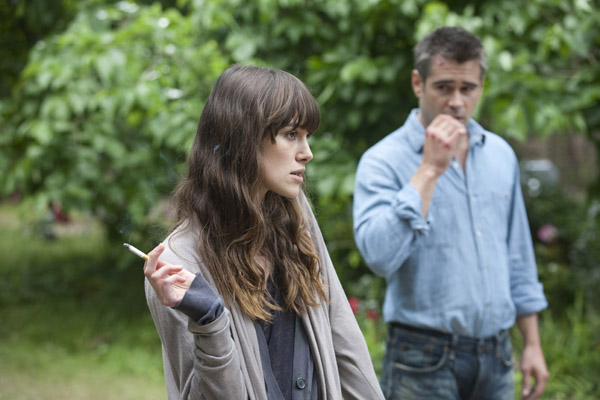
Keira Knightley and Colin Farrell in LONDON BOULEVARD (Photo: Laurie Sparham/IFC Films)
Written & Directed by William Monahan, based on the novel by Ken Bruen
Produced by Graham King, Monahan, Tim Headington & Quentin Curtis
Released by IFC Films
UK. 104 Mins. Rated R
With Colin Farrell, Keira Knightly, David Thewlis, Ben Chaplin, Anna Friel, Eddie Marsan & Ray Winstone
Just out of prison, Mitchel (Colin Farrell) is a gangster, or was a gangster, but as it goes with criminals who’ve been inside, they either continue with crime or try and go on the straight and narrow. Mitchel wants to do the latter, especially as he can become particularly aggressive (and just flat-out violent) when in gangster-mode. So he follows his first instinct, which is to land a somewhat legit job. Through a connection he gets a gig as a bodyguard for a movie star, Charlotte (Keira Knightly), hounded by the Paparazzi outside her house. But as he settles into the relative ease of the job—and a romance slowly blooms between the two—Mitchel gets brought back to a life of crime against his better judgment by a sleazy friend, Billy (Ben Chaplin), and a surly mob boss (Ray Winstone), who doesn’t usually take “no” for an answer when asking someone to join his crew.
A lot of these ingredients are hardly new. On the contrary, I have a feeling writer/first-time director William Monahan knew these plot points so well that he also knew how to make them fresh: find the right cast, give the film some panache and style (mostly through peppering in some foul-mouthed British dialog here and there and some keen choices in music), and let the characters lead the story more than the actual plot. In other words, it’s as much, if not more so, a character study than it is a by-the-numbers crime drama.
In a way that’s what most connects this film to Monahan’s greatest success, his script for The Departed, where personalities and darkly comedic dialog drove that movie along. Among the top-notch cast, Farrell brings a certain vulnerability and intelligence to Mitchel that probably wasn’t there on the page. Knightley kinda has a cake walk here, though there are a few scenes in which romance blooms between Mitchel and Charlotte where she shows a little more range than just being Keira Knightley. David Thewlis has a really wonderful and wry supporting turn as the caretaker at Charlotte’s home (or rather, he hangs out at her pad, smokes a lot of J’s, and reminisces about being a once-promising actor). Chaplin’s Billy kind of gets the short end of the stick as far as character dimensions—he’s untrustworthy as a fast-talking (and later pleading) criminal from the moment he’s on screen to the last—but he gives off a certain intensity.
Best of all, though, is Ray Winstone as a kind of a reversal of Jack Nicholson’s crime boss in The Departed. Winstone gets to play classy and crazy, sometimes in the same scene. Gant is a rough mother-f-er, but he comes on at first really calm and cool talking to Mitchel, sometimes wearing oddly intimidating sunglasses (indoors). And when he explodes—when he tries to implicate Mitchel as an accessory to a murder—it’s stunning to watch how Winstone could steal these scenes but still give space for others (Farrell and Chaplin) to dig in on the fun of chewing up the scenery.
London Boulevard is set in present day England, though it could have taken place back in the late 1960’s based on the soundtrack, which starts off brilliantly with the Yardbirds “Heart Full of Soul” and continues with the Rolling Stones and English rock of the period, and yet it has a kick that a work that is legitimately edgy needs. When violence occurs, it’s sharp and bloody, but the fun is seeing what happens leading up to it, and the interactions between the characters make the movie compelling beyond the plot mechanics. There’s even room occasionally for some real heart, like in a subplot with an aged friend of Mitchel’s who is living on the streets. The old man is assaulted by some young punks, which leads to his death. How Mitchel deals with this gives a strong contrast to other scenes where his conflicts are forced upon him by others.






what is the brand of colin farell sunglasses in london boulevard?